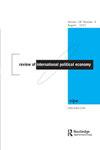Music, time, and international political economy: making coevalness
IF 3.7
1区 经济学
Q1 ECONOMICS
引用次数: 0
Abstract
Abstract Recent critical studies in International Political Economy (IPE) have engaged with the ‘temporal turn’ in International Relations. However, outside of postcolonial critiques, this temporal turn in IPE has not considered how subjects share time or how coevalness is produced. This paper explores the problem of coevalness by asking how music produces shared time and plural temporalities. It analyses a collection of experimental electronic music, 4 Women No Cry, arguing that mobilising vulnerabilities through the co-presence of bodies in ‘musicking’ points towards possibilities for subjectivity beyond the individuated, sovereign, autonomous individual subject and for an intercorporeal subjectivity emerging from the intertwining of material and social relations. This article thus does not offer an ‘IPE of music’ but rather asserts, via music, a deepening of the critique of temporality and of subjectivity, opening further possibilities for political critique in IPE.音乐、时间与国际政治经济:形成同一性
摘要国际政治经济学(IPE)最近的批判性研究涉及国际关系的“时间转向”。然而,除了后殖民主义的批评之外,IPE的这种时间转向并没有考虑到受试者如何共享时间或男女平等是如何产生的。本文通过询问音乐如何产生共享时间和复数时态来探讨男女平等问题。它分析了一组实验性电子音乐集《4个女人不哭》,认为在“音乐创作”中通过身体的共同存在来调动脆弱性,指向了超越个体、主权、自主的个体主体的主观性的可能性,以及从物质和社会关系的交织中产生的实体间主观性的可能性。因此,本文并没有提供“音乐的IPE”,而是通过音乐断言,对时间性和主观性的批判的深化,为IPE中的政治批判开辟了进一步的可能性。
本文章由计算机程序翻译,如有差异,请以英文原文为准。
求助全文
约1分钟内获得全文
求助全文
来源期刊
CiteScore
9.20
自引率
9.30%
发文量
47
期刊介绍:
The Review of Political Economy is a peer-reviewed journal welcoming constructive and critical contributions in all areas of political economy, including the Austrian, Behavioral Economics, Feminist Economics, Institutionalist, Marxian, Post Keynesian, and Sraffian traditions. The Review publishes both theoretical and empirical research, and is also open to submissions in methodology, economic history and the history of economic thought that cast light on issues of contemporary relevance in political economy. Comments on articles published in the Review are encouraged.

 求助内容:
求助内容: 应助结果提醒方式:
应助结果提醒方式:


